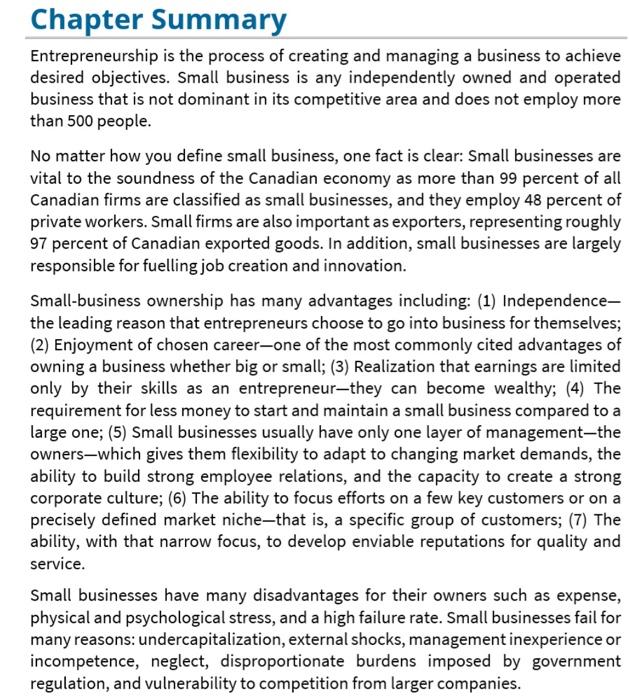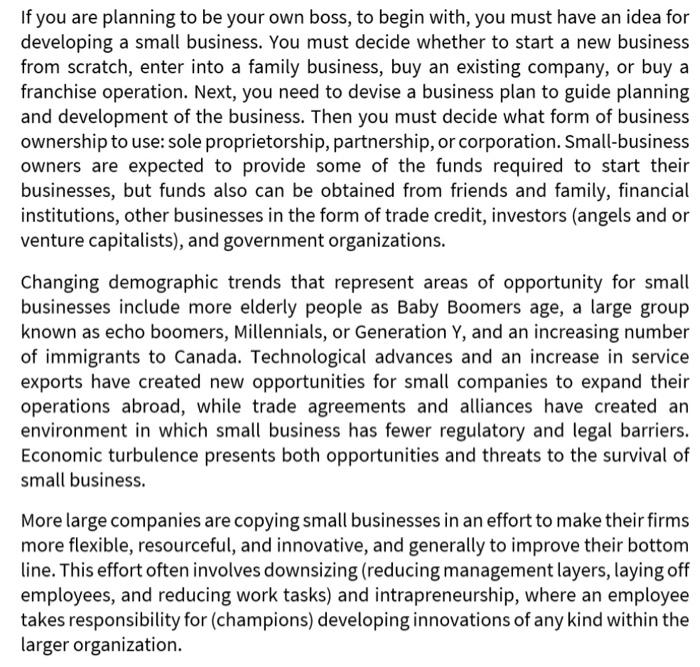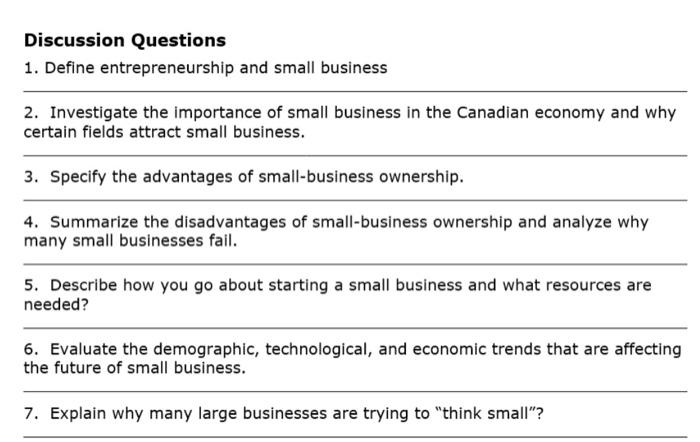Chapter Summary Entrepreneurship is the process of creating and managing a business to achieve desired objectives. Small business is any independently owned and operated business that is not dominant in its competitive area and does not employ more than 500 people. No matter how you define small business, one fact is clear: Small businesses are vital to the soundness of the Canadian economy as more than 99 percent of all Canadian firms are classified as small businesses, and they employ 48 percent of private workers. Small firms are also important as exporters, representing roughly 97 percent of Canadian exported goods. In addition, small businesses are largely responsible for fuelling job creation and innovation. Small-business ownership has many advantages including: (1) Independence- the leading reason that entrepreneurs choose to go into business for themselves; (2) Enjoyment of chosen career-one of the most commonly cited advantages of owning a business whether big or small; (3) Realization that earnings are limited only by their skills as an entrepreneur-they can become wealthy; (4) The requirement for less money to start and maintain a small business compared to a large one; (5) Small businesses usually have only one layer of management,the ownerswhich gives them flexibility to adapt to changing market demands, the ability to build strong employee relations, and the capacity to create a strong corporate culture; (6) The ability to focus efforts on a few key customers or on a precisely defined market niche-that is, a specific group of customers; (7) The ability, with that narrow focus, to develop enviable reputations for quality and service. Small businesses have many disadvantages for their owners such as expense, physical and psychological stress, and a high failure rate. Small businesses fail for many reasons: undercapitalization, external shocks, management inexperience or incompetence, neglect, disproportionate burdens imposed by government regulation, and vulnerability to competition from larger companies. If you are planning to be your own boss, to begin with, you must have an idea for developing a small business. You must decide whether to start a new business from scratch, enter into a family business, buy an existing company, or buy a franchise operation. Next, you need to devise a business plan to guide planning and development of the business. Then you must decide what form of business ownership to use: sole proprietorship, partnership, or corporation. Small-business owners are expected to provide some of the funds required to start their businesses, but funds also can be obtained from friends and family, financial institutions, other businesses in the form of trade credit, investors (angels and or venture capitalists), and government organizations. Changing demographic trends that represent areas of opportunity for small businesses include more elderly people as Baby Boomers age, a large group known as echo boomers, Millennials, or Generation Y, and an increasing number of immigrants to Canada. Technological advances and an increase in service exports have created new opportunities for small companies to expand their operations abroad, while trade agreements and alliances have created an environment in which small business has fewer regulatory and legal barriers. Economic turbulence presents both opportunities and threats to the survival of small business. More large companies are copying small businesses in an effort to make their firms more flexible, resourceful, and innovative, and generally to improve their bottom line. This effort often involves downsizing (reducing management layers, laying off employees, and reducing work tasks) and intrapreneurship, where an employee takes responsibility for (champions) developing innovations of any kind within the larger organization. Discussion Questions 1. Define entrepreneurship and small business 2. Investigate the importance of small business in the Canadian economy and why certain fields attract small business. 3. Specify the advantages of small-business ownership. 4. Summarize the disadvantages of small-business ownership and analyze why many small businesses fail. 5. Describe how you go about starting a small business and what resources are needed? 6. Evaluate the demographic, technological, and economic trends that are affecting the future of small business. 7. Explain why many large businesses are trying to "think small









